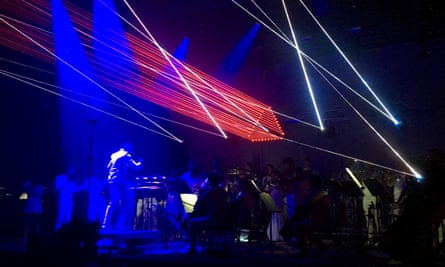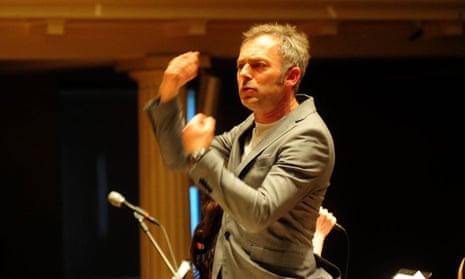What was the first record or CD you bought?
Actually I bought three at once, when I was seven. It must have been a bumper birthday! They were Abba Arrival, an LP of JS Bach’s organ music and Tomita’s The Engulfed Cathedral. I wanted to kiss Agnetha, play the organ in any gothic cathedral, and own a brace of Moog synthesisers. I had ambition.
What’s your musical guilty pleasure?
Conducting the Swedish Radio Symphony in The Legend of Zelda. The Swedes are awesome for pretty much any music I might play with them, but this is something that gives us all a bit of a rush.
If you had time learn a new instrument, what would it be?
The bass oboe.
If you had to pick one work to introduce someone to the wonders of classical music, what would it be?
Arnold Schoenberg’s Verklärte Nacht (Transfigured Night), because it has the bracing energy of a cliffhanger, poised on the very last rocky outcrop of romanticism, ready to plunge into a new music freefall – the uprush of atonality. Also, because it is about boy-meets-girl and the sweet torture of first love/angst. It’s one of the most groin-churningly beautiful and savage pieces of music ever written. Incidentally it’s also the first work I conducted with a professional orchestra, when I was starting out. The whole experience of that music and those musicians was so seismically exciting for me, I got the trembles, lost control of my baton and stuck it in my eye.
What single thing would improve the format of the classical concert?
Firstly I want to see true inclusivity, by which in the first instance I mean a genuine mix on stage of able-bodied and disabled, black, white and everything in between – not through tokenism but sheer bloody talent.

Secondly, the genuine desire of every artist on that stage to engage and embrace the audience, through the music. Whatever music it is, however difficult it is, any worthwhile music will speak to any audience if the intention is right. It is all about a mindset of sharing, not showing. Music is communication, an act of love, not a display.
What or where is the most unusual place you’ve performed?
Three recent situations: improvising with 40 musicians packed into a fleet of hot air balloons, about 500 metres up; performing Beethoven’s Seventh Symphony with Copenhagen Philharmonic, the orchestra spread out in a giant circle 30 metres wide inside an old Carlsberg warehouse in Copenhagen; and headlining the Park stage at Glastonbury 2016 with my orchestra Army of Generals, featuring members of the British Paraorchestra, playing Philip Glass’s “Heroes” Symphony to a rapt and mud-encrusted crowd of 20,000.
What’s been your most memorable live music experience as an audience member?
Watching Valery Gergiev and the Mariinsky Orchestra in St Petersburg playing Shostakovich’s 10th Symphony. There was blood on the floor, the walls and the ceiling. In a good way.
What was the last piece of music you danced to?
A salsa marathon in Bogotá, Colombia.
We’re giving you a time machine: what period, or moment in musical history, would you travel to and why?
To Vienna, August 1791, armed with a suitcase of cash and accompanied by the best 21st-century doctor money could buy. We’d find Mozart, reverse his ill health and give him enough money to be extravagantly comfortable for a long life as the world’s greatest composer and number one ecstatic human being.
What’s the most overrated classical work? – ie is there a warhorse whose appeal you really don’t relate to?
Anything by Johann Strauss, father or son. Those polkas, waltzes and marches are about as satisfying as eating 200 packets of Haribo Sour Suckers.
Which non-classical musician would you like to work with?
It’s late, you’ve had a few beers, you’re in a Karaoke bar. What do you choose to sing?

Comments (…)
Sign in or create your Guardian account to join the discussion